*Note from A Chronic Voice: Sara graciously agreed to share her life experiences for the Invisible Cities linkup, when I learned that she resides in the beautiful countryside of Italy! Living in Europe (at least for a while) is a dream of mine, so this was a particularly inspiring read for me. The insight into the healthcare system there is also valuable for anyone who is looking to live, work or travel there. Without further ado, here’s Sara for you! 🙂
*Note: Images are all from Unsplash, unless otherwise stated.
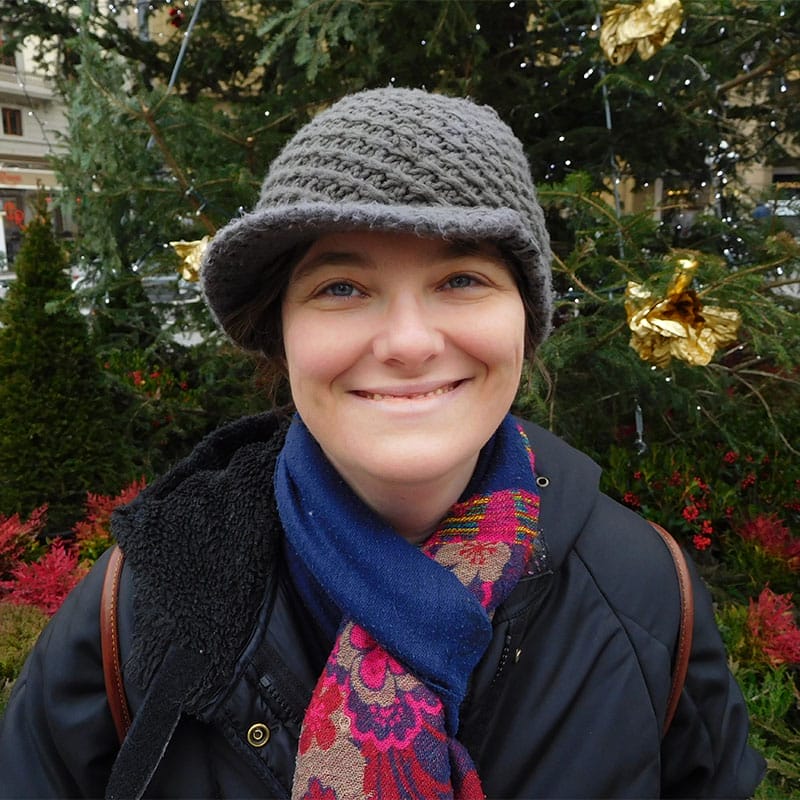
A happy hello from Sara (Source: Sara Russell)

Chronic Illness in and Around Florence
As a quick introductory note, I live in a small town in the Tuscan countryside, an hour outside of Florence. So my piece will make reference both to small-town life and Florence life. There are some gaps in what I’m able to say about Florence because my severe chemical sensitivity limits how frequently I go into the city and what I do there.

Snowy landscape in Italy. (Source: Sara Russell)

Foggy in Italy. (Source: Sara Russell)
- Best thing about your city for living with chronic illness?
I live in the countryside because I have a severe chemical sensitivity and have a hard time with artificial fragrances, chemical odors, cigarette smoke and car exhaust.When I go into the city, there are a few things that strike me. It’s a beautiful city, full of art, history and culture. There are all kinds of museums, artisan shops, boutiques, markets and more. There are several top-notch hospitals. The restaurant choices in Florence are almost endless, and there are many places that people with food allergies, celiac disease and other health issues that cause dietary restrictions can eat without worrying. Many of the Florentine restaurants and public places have outdoor seating where service animals are not only allowed but truly welcome.
- Worst thing about your city for life with chronic illness?
I have to be very careful about chemical exposures when inside the city. There’s a lot of smoking in outdoor public spaces (although not inside restaurants, libraries, etc.) and Italians (not to mention a lot of tourists) love wearing lots of perfume in the city. Thus I often wear my filtrating face mask when out and about in Florence. - How accessible do you think your city is?
For those with wheelchairs, Florence is a mixed bag in terms of accessibility. Hospitals are equipped with elevators, wheelchair ramps, etc., and some apartment buildings have working elevators. The sidewalks and cobbled streets aren’t wheelchair-friendly. Some of the museums and other public attractions are accessible, but even this can be a mixed bag. - How educated is the public on chronic illnesses there?
It’s a real mixed bag. From the point of view of food allergies and celiac disease, I find Florence to be far ahead of many other cities I’ve visited, and Italian food service in general has a very high level of awareness and very good protocols regarding food restrictions.However, the general level of ignorance regarding the impact of cigarette smoke, artificial scents and other chemical exposures is pretty astounding. While it’s against the law to smoke in hospitals, patients and medical staff do sometimes smoke inside hospital bathrooms in Italian cities, and I once got into a verbal altercation with a man who smoked inside a crowded allergy and immunology department at a major hospital in Florence.
Italian culture is super-interesting, because, at least as someone coming from the American context, I find that there are huge ups and downs in various areas. For example, I find Italian mainstream culture to be relatively dismissive and ignorant regarding invisible illness, wheelchair accessibility and chemical sensitivity, yet incredibly accommodating to people with chronic mental disabilities.
It might be fair to say that Italian culture is relatively more egocentric than American culture, which in practice means that in general, Italians tend to care less about other people’s problems than Americans do, and to be less helpful and responsive than their American counterparts are.
For example, it’s completely normal for a smoker to feel entitled to smoke even in the presence of pregnant women, babies and small children, people with asthma, and chemically sensitive people. When asked by someone with special health needs to stop smoking, the smoker is unlikely to comply and fairly likely to get very angry with the person who made the request, no matter how ill the person may be as a result of the exposure.
There’s a bit of a general ‘it’s not my problem – it’s your problem – deal with it and don’t bother me’ kind of attitude in the general public – less empathy, more entitlement. Yet there are some striking exceptions, and food service and many areas of medical care are notable in this regard.
- If you could pass one new law in your country, what would that be?
Italy is a strange place. People don’t really follow the law, because there isn’t a strong enforcement system or a cultural ethic of looking out for other people. So I wouldn’t bother passing new laws, but would work on enforcing the existing laws regarding accessibility and smoking in public places.I would also work on an education campaign to inform the public about chemical sensitivities and wheelchair accessibility, and really just common sense lessons about kindness and respect for fellow humans, and particularly folks who are in some way ‘different’ from the norm, whether visibly so or not.
- Which is your favourite city or country (other than your own) and why?
I have a special place in my heart for Berkeley, California. - Where in the world would you visit, if disability, illness or level of fitness weren’t an issue?
I would love to visit Alaska, and see the Northern Lights. - What sort of ‘alternative treatments’ wouldn’t raise any eyebrows there? (Perhaps it’s ingrained in the culture, totally legal, etc).
Italy is a real mixed bag in terms of alternatives to the mainstream. However, CBD oil is available by prescription from pain clinics. And when I was at a medical conference on the Ehlers-Danlos Syndromes and Hypermobility Spectrum Disorder a few months ago, I was very impressed with the level of knowledge and understanding that the pain specialist conveyed about the responsible and effective integration of CBD into the treatment of pain.I’m not sure that outside of an audience of rare disease doctors and patients, that eyebrows wouldn’t be raised. In general, Italian culture and Italian mass media are very much about allopathic positivism and anyone who falls through the cracks of the system gets shunted to the side.
My neurologist and my geneticist prescribe mostly nutritional supplements, which I think may be looked at as strange in other countries.
- Which are the most and least affordable alternative therapies there? How much do they cost in general?
The Universalized Medicine System
There is, at least in theory, a universalized medicine system with copayments that are assessed on a sliding fee scale based on family income. In theory, people with one of more debilitating illnesses and/or disabilities have access to a medical exemption for services related to the illness or disability.However, there is a lot of red tape and thus not everyone with significant health issues has any significant exemptions. I have spent a fortune on copays for medical visits, not so much because of the cost of each single visit, but because as someone with a very complex and multi-system condition, the visits certainly add up over time, and sometimes I’ve had to travel quite far away to find a specialist in my field. I have to pay out of pocket for private physical therapy sessions. My physical therapist is top-notch and I pay 35€ per session.
Allergy Desensitization Specialists
I am lucky that in Florence, the San Giovanni di Dio hospital’s allergy and immunology department specializes in allergy desensitization treatments. I went through a cycle of desensitization treatment for a class of antibiotics because I’d become allergic to every antibiotic except doxycycline (not ideal for someone with a diagnosis of neutropenia). The program was very good.A Neuromuscular Rehabilitation Program
I was also very lucky to participate as an inpatient in a three-week intensive physical therapy program in a neuromuscular rehabilitation program in a hospital in Bozzolo, near Mantua, a few hours from Florence. There was a non-profit that funded the project, and I paid nothing for the three-week stay in the hospital and for the treatments. The physical therapists and neurologists working at the hospital in Bozzolo were truly top-notch.Difficulties with Finding a Suitable Allergist/Immunologist in Florence
I haven’t found an allergist/immunologist in Florence that is able to support me for my severe allergies and my neutropenia. I’ve been left to my own devices, beyond getting allergy testing at the Careggi Hospital, where the allergist on staff literally went into a panic when he saw the welts that the skin prick test had caused, and I had to calm him down (something that never happened to me in the US). The doctor then proceeded to tell me, “Madam, you’re allergic to the entire plant kingdom. As long as you refrain from touching, breathing, or eating anything, you’ll be alright.” I found his attitude to be unprofessional and frankly histrionic.An Amazing Neurologist
That being said, I have an amazing neurologist who follows me for my chronic migraine at the Careggi Hospital in Florence. He took a super-detailed history, listened carefully to the past medications that had been tried and my adverse reactions to prior medications.He hypothesized that my allergies were driven by excessive mast cell activation and has been treating the migraines with modest success with mast cell stabilizers. He’s a great listener and is very responsive to email updates/queries (mind you, I only email when strictly necessary and am respectful of his time).
Celiac Disease vs Food Allergies in Italy
It’s worth mentioning that if one has a diagnosis of celiac disease in Italy, one gets access to 100€ in vouchers valid for the purchase of certified gluten-free grocery items per month, regardless of income. There isn’t any such benefit for people with diagnosed food allergies, no matter how severe the allergies are.Group Homes for Adults with Mental Disabilities
One service that is provided in Italy, including in and near Florence, are group homes for adults with mental disabilities. These provide a family-style group living situation with varying degrees of round-the-clock care, completely covered by the Italian public health system.With reasonable variations depending on the severity of the person’s mental health condition, the residents have a treatment plan that includes varying degrees of daily and weekly household chores (including self-care), and when appropriate, are placed in part-time work or volunteering positions well-matched to the person’s ability, conditions, passions and preferences. Meals are shared, family-style, and the residents receive a modest monthly stipend.
For someone coming from the U.S., where no such service is offered, much less covered by the medical care system, I’m quite impressed.
- How expensive is it to live with a chronic illness there? Any stats you’d like to share to give a clearer picture?
Overall, living with a chronic illness near Florence is much more affordable than living with a chronic illness in the U.S., where I previously lived. Nonetheless, the more medical care you need and the less you fit the right type of molds for getting medical exemptions, the more your care ends up costing. - What are the hospitals like in terms of service, quality of care, emergency room protocols, etc?
It really depends on which hospital, what condition the patient has, and who’s on staff. That being said, the general quality of Italian hospitals is good and the quality of service is quite excellent for the price.There is a top-notch children’s hospital in Florence, the Meyer Hospital, with a very good emergency room and an excellent range of specialty departments.
There are two very good general hospitals in Florence with good emergency departments and a good range of specialty departments, the Careggi Hospital and the San Giovanni di Dio Hospital. I haven’t been able to cover all my specialty care needs, but am definitely better cared for medically than I was at any point while living in the U.S..
- What should foreigners be aware of in regards to healthcare, if they want to visit or work in your city?
The emergency department staff have at least good functional English language skills. Emergency care is quite good and surprisingly affordable.
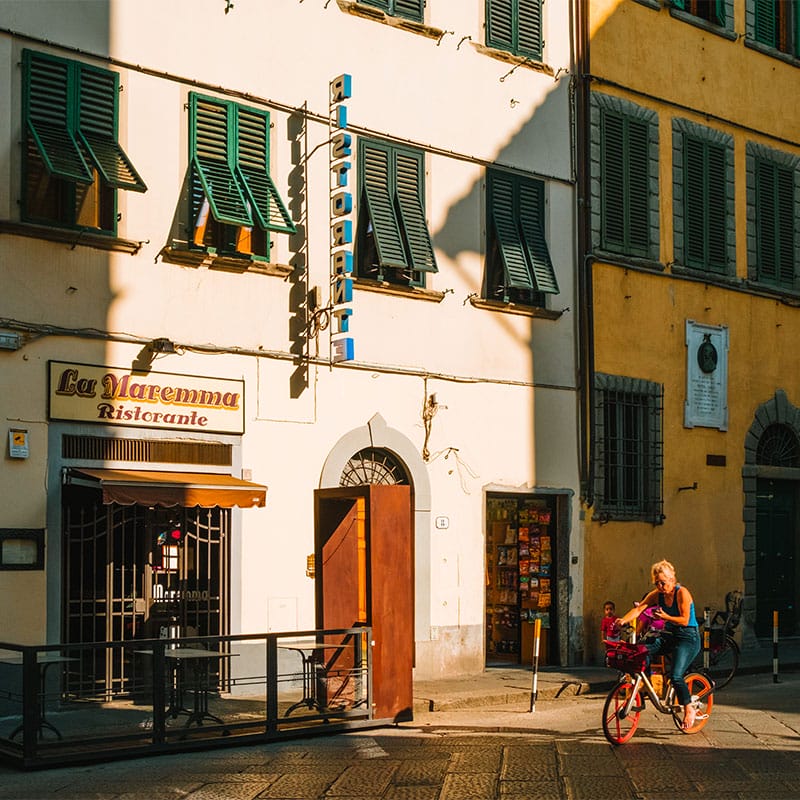
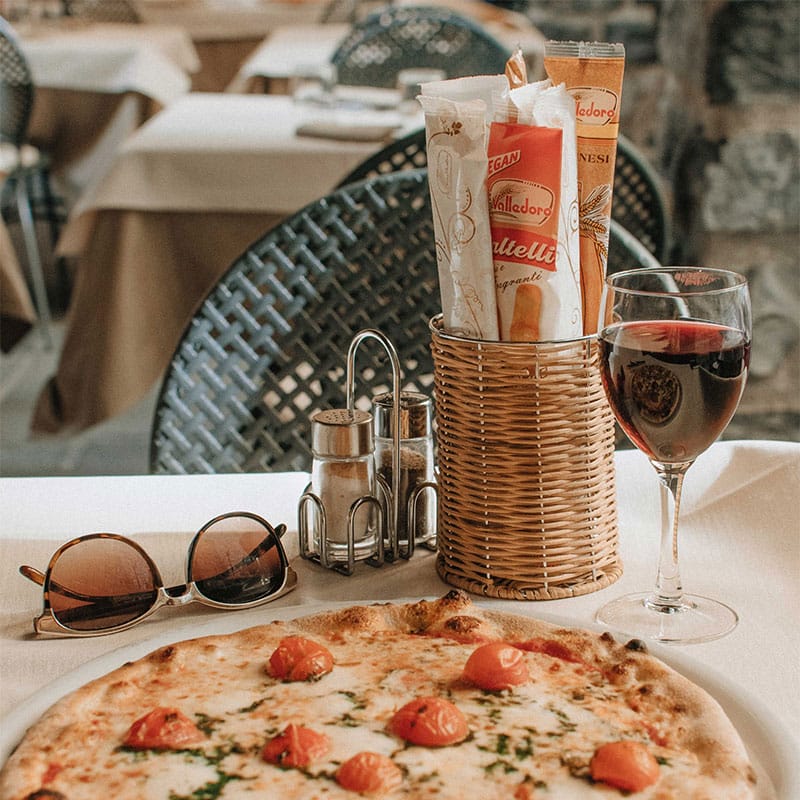



Share Your City & Discover More in the: Invisible Cities Linkup.
Explore Florence Through More Images on My: Travel Blog Part One and Travel Blog Part Two.
*Note: This Q&A is meant for educational purposes, based on personal experiences only. Nothing is to be substituted for medical advice. Please consult your own doctor before changing or adding new treatment protocols.
If you liked this article, sign up for our mailing list here so you don’t miss out on our latest posts! You will also receive an e-book full of uplifting messages, quotes and illustrations, as a token of appreciation!
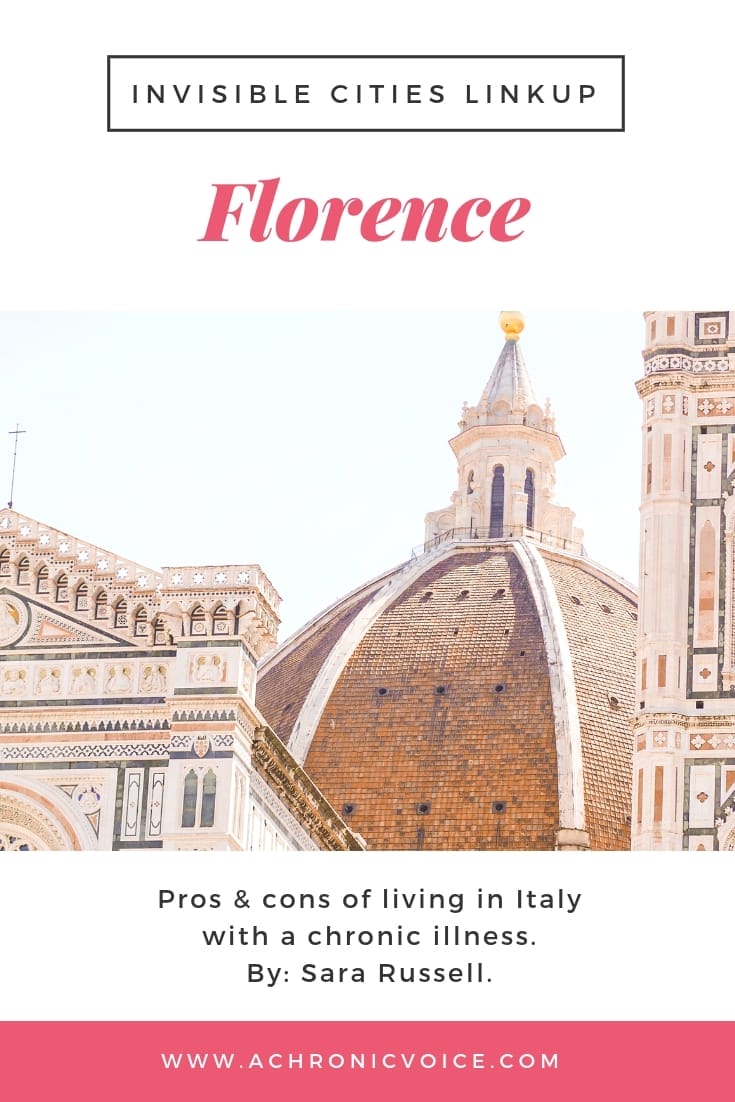
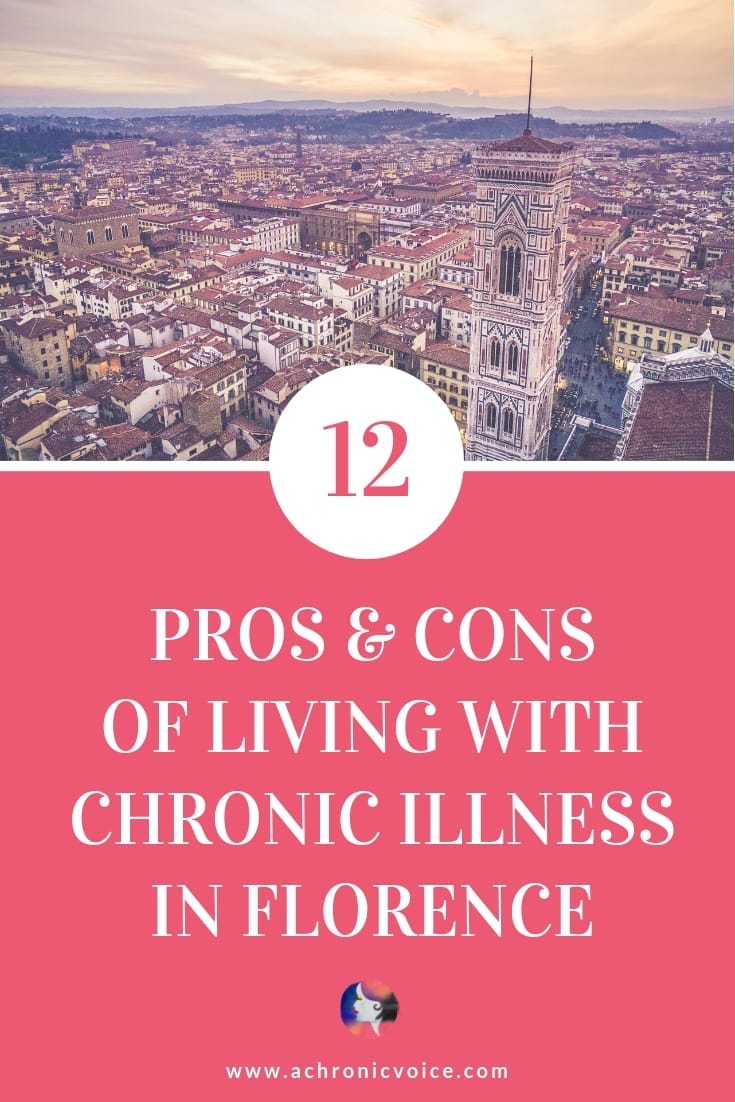
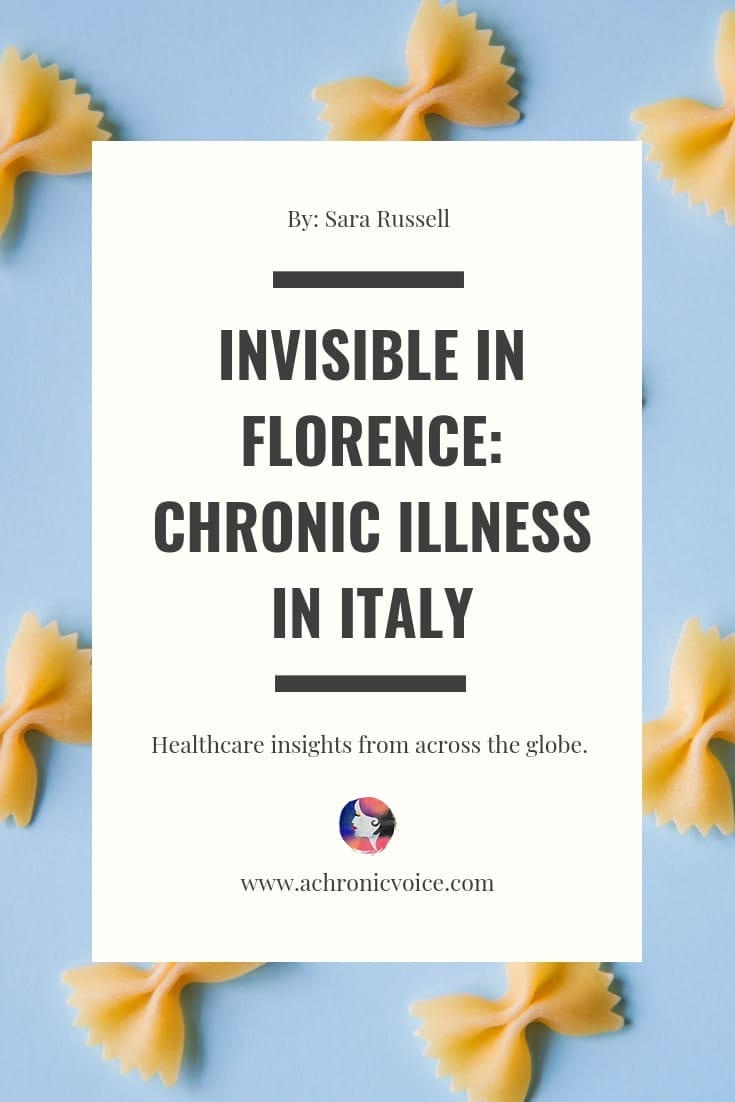
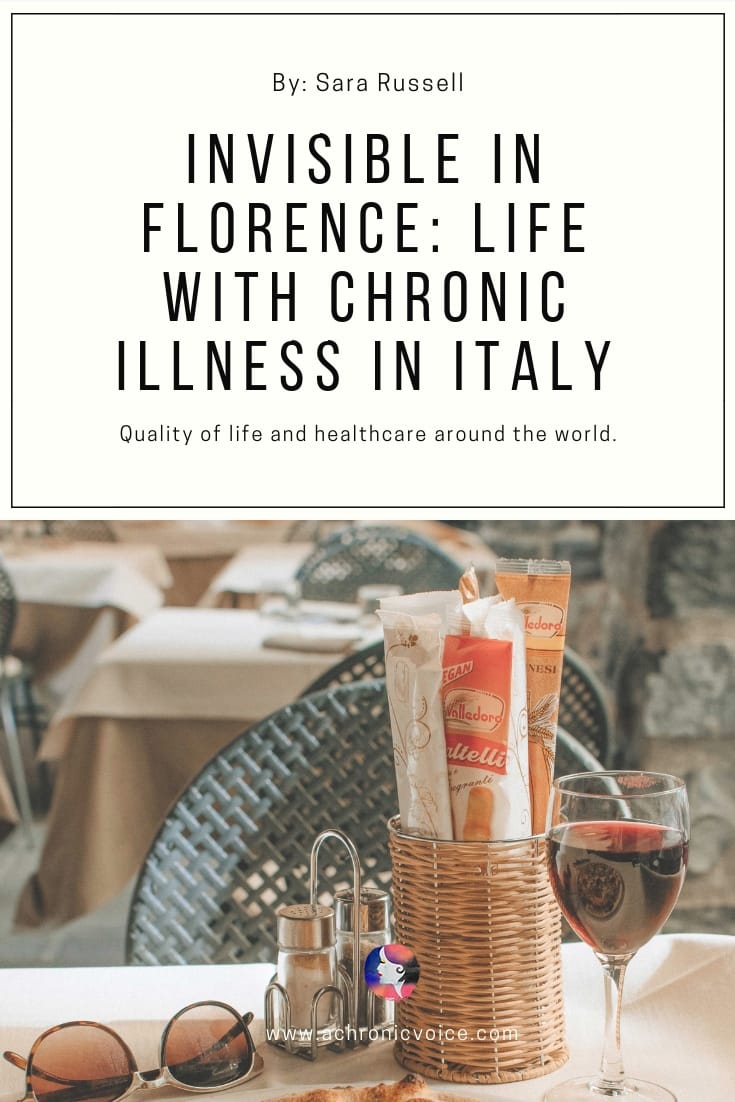
Contributor Bio
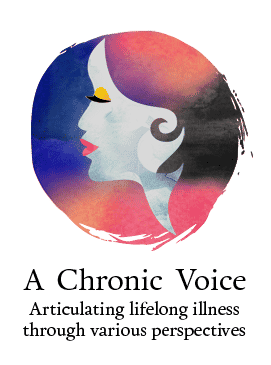
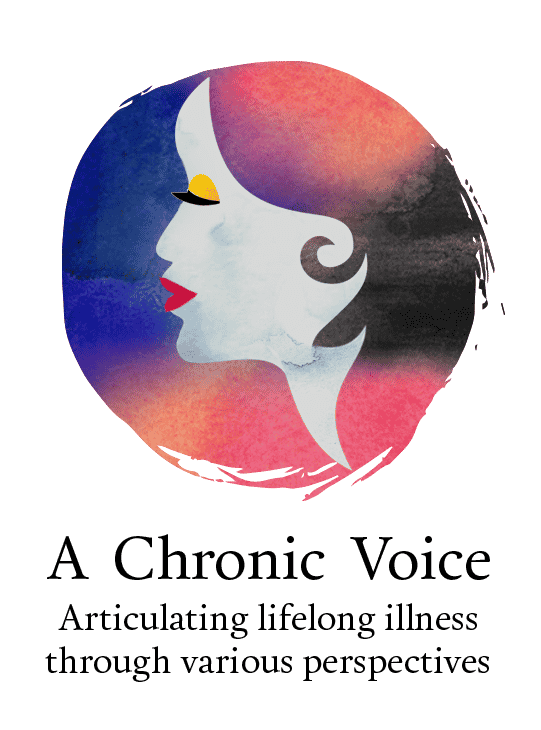
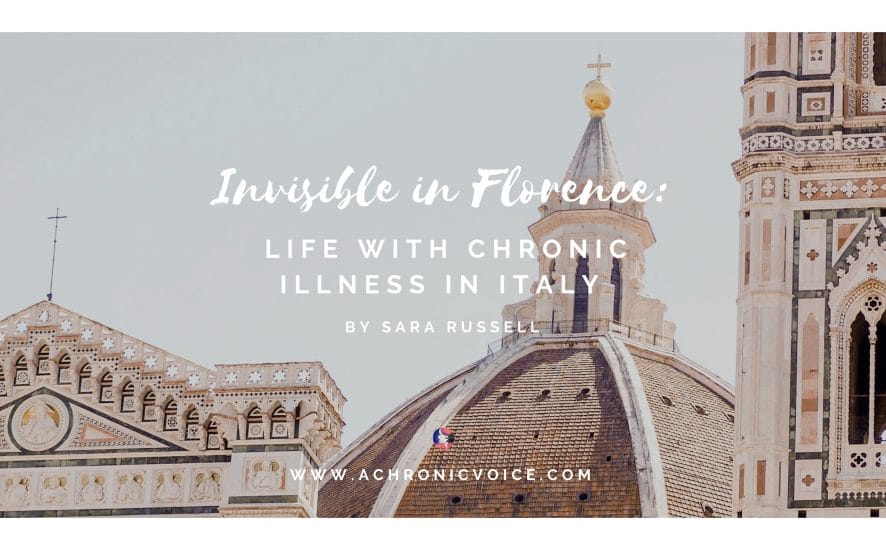

Interesting post! How impressive that in Italy, people with celiac disease get access to vouchers for the purchase of certified gluten-free grocery items, regardless of income. But, I agree with your statement: “…too bad there isn’t any such benefit for people with diagnosed food allergies, no matter how severe the allergies are.”
Hi Rhonda, yes I found it interesting too! It’s fascinating how different life can be around the world, especially with illness thrown into the mix!
This was really interesting! And the photos are so beautiful!
I agree! They’ve all been interesting though! 🙂